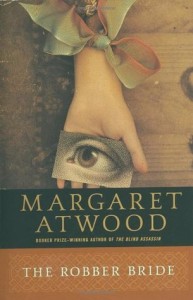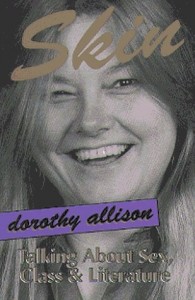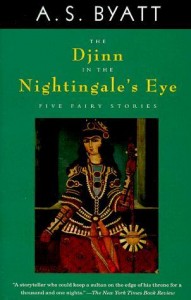 Margaret Atwood writes in the first chapter of The Robber Bride, “Where to start is the problem because nothing begins where it begins and nothing’s over when it’s over, and everything needs a preface” but she knows exactly where to begin. She begins by creating a world in which the reader could not possibly like Zenia and she does it while the actual character remains almost entirely offscreen.
Margaret Atwood writes in the first chapter of The Robber Bride, “Where to start is the problem because nothing begins where it begins and nothing’s over when it’s over, and everything needs a preface” but she knows exactly where to begin. She begins by creating a world in which the reader could not possibly like Zenia and she does it while the actual character remains almost entirely offscreen.
“The sun moves into Scorpio, Tony has lunch at the Toxique with her two friends Roz and Charis, a slight breeze blows in over Lake Ontario, and Zenia returns from the dead.” –Margaret Atwood
When Zenia she first appears, we know only that she is supposed to be dead and that people are glad. We have met her through the Tony’s memories and Tony’s reaction to her appearance. Zenia does not interact with any of the main characters at that time.
Atwood switches the focus to Charis and then Roz and we come to know and love them and to see their hatred of Zenia, but we still haven’t met her. I sympathize with Tony and Charis and Roz and I believe in their interpretation of Zenia because I have come to know them as full, round characters. I know from them and from their friends their virtues and their faults. The only character who has only faults in Zenia.
What I love about this book so far is that Margaret Atwood is too smart to have Zenia be merely a flat, despicable villain. She has to have a backstory. But at this point Zenia could be the nicest person in the world and she would still have difficulty convincing me of it because I have made friends with Tony, Charis, and Roz, and she is the enemy of my friends. I cannot wait to see how Atwood changes my mind about Zenia.
Introducing a character through rumor is something Fitzgerald did well in The Great Gatsby. I had all kinds of preconceived notions about Gatsby before I ever met him and I loved seeing where the truth of reading proved and disproved them. Though I can see what Atwood is doing, I am loving the process of being manipulated and I am so excited to find out what she does next.
If this review made you want to read the book, pick up a copy of The Robber Bride from Bookshop.org. Your purchase keeps indie booksellers in business and I receive a commission.
 Reading
Reading  The world is conspiring to make me a feminist and I’m realizing how sadly overdue that evolution is. I had to become a writer before I could love myself as a woman, and I had to do both before I could become a feminist. This week Dorothy Allison taught me about all of these identities.
The world is conspiring to make me a feminist and I’m realizing how sadly overdue that evolution is. I had to become a writer before I could love myself as a woman, and I had to do both before I could become a feminist. This week Dorothy Allison taught me about all of these identities. Lately I’ve been drawn to fairytales and myths. Perhaps I am trying to recover an ebbing capacity for storytelling in my suddenly busy life, and perhaps I’m looking to get lost in the wonder of stories the way I did when I was a kid. Perhaps I’m missing afternoons at Louisa’s with Bob and Jack and their emphasis on the mythic journey. When I stumbled on AS Byatt’s The Djinn in the Nightingale’s Eye, I thought I wanted to read it because it spoke to the Arabian Nights, but what I fell in love with was the overall fairytale quality of the book and its five stories and what they told me about being a woman.
Lately I’ve been drawn to fairytales and myths. Perhaps I am trying to recover an ebbing capacity for storytelling in my suddenly busy life, and perhaps I’m looking to get lost in the wonder of stories the way I did when I was a kid. Perhaps I’m missing afternoons at Louisa’s with Bob and Jack and their emphasis on the mythic journey. When I stumbled on AS Byatt’s The Djinn in the Nightingale’s Eye, I thought I wanted to read it because it spoke to the Arabian Nights, but what I fell in love with was the overall fairytale quality of the book and its five stories and what they told me about being a woman.